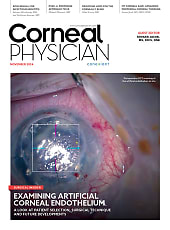APX3330, a first-in-class small-molecule inhibitor of REF-1 (reduction oxidation effector factor-1 protein), may represent a promising oral treatment option for delaying or preventing disease progression in patients with non-proliferative diabetic retinopathy, Veeral Sheth, MD, MBA, reported at the 21st Annual Angiogenesis, Exudation, and Degeneration 2024 Conference recently.
APX3330, which is being developed by Occuphire Pharma, is an oral tablet administered twice a day for treatment of diabetic retinopathy. It works by inhibiting REF-1, which reduces vascular endothelial growth factor (VEGF) and inflammatory cytokines which are known to play key roles in ocular angiogenesis and inflammation. The company has recently completed a phase 2 study (ZETA-1) as well as an end-of-phase-2 meeting, and plans to submit a Special Protocol Assessment to the FDA.
Dr. Sheth presented results of the phase 2 ZETA-1 trial, a multicenter, randomized, double-masked, placebo-controlled trial that enrolled 103 subjects. Analysis of ZETA-1 results showed only 5% of subjects treated with APX3330 had a clinically meaningful ≥3-step worsening on a binocular 17-step person-level scale using the Diabetic Retinopathy Severity Scale (DRSS) at week 24, compared with 13% of placebo patients (P=0.18). APX3330 also showed favorable safety and tolerability in patients who continued to manage their diabetic comorbidities. NRP








